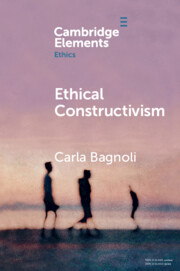Element contents
Ethical Constructivism
Published online by Cambridge University Press: 11 January 2022
Summary
Keywords
- Type
- Element
- Information
- Series: Elements in EthicsOnline ISBN: 9781108588188Publisher: Cambridge University PressPrint publication: 03 February 2022
References
- 16
- Cited by



